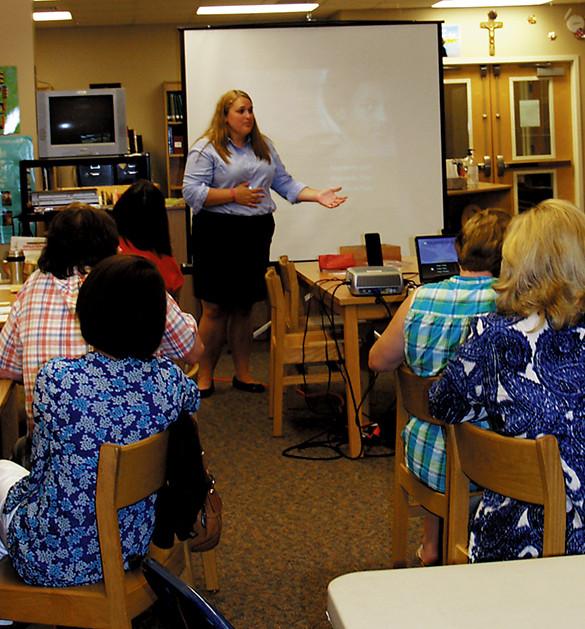By Maureen Smith
MADISON – The diocesan Office for the Protection of Children welcomed Audrey Oliver, a safety analyst from Praesidium, for two workshops in August. Praesidium is the company that produces “Called to Protect,” the program used in schools and parishes in the Diocese of Jackson.
Oliver led workshops in Madison and Tupelo for catechists and parish leaders who will actually be training youth. “We talked about boundaries, how molesters violate them and how teens can protect themselves,” she explained. In these workshops, Oliver goes through the training process, even asking the adults to participate in the activities teens will do during their trainings. Each group gets a sample situation and they have to discuss how they would react. This exercise in Madison inspired a lively group discussion about how the teens might react.

Audrey Oliver, standing, left, trains catechists in “Called to Protect” during a workshop at St. Joseph School. (Photo by Maureen Smith)
Oliver said she often gets feedback to take back to Praesidium from these trainings. “A lot of people said they have to deal with teens who act as if they don’t want to take this training seriously. This material can be hard to talk about, it can be embarrassing. Sometimes this is the first time people are giving them information about sexual abuse,” she said. “What I tell the trainers is that it isn’t just meant to be you teaching. It’s also about having a discussion with youth. It’s about them talking about their feelings and you have to assure them you are available to them,” Oliver added. Trainers have reported that victims of abuse have come forward as a result of the trainings.
In the afternoon sessions Oliver talked specifically about bullying. “I talked about how to recognize bullying as being different than normal teenage conflict and how to monitor high risk areas and activities for bullying,” said Oliver.
“Bullying is intentional, repeated conduct or negative behavior against a youth who has trouble defending himself or herself,” she explained. Teens will have conflicts, but in normal conflict the people involved are on equal footing and they seek some resolution to their conflict. Bullying, said Oliver, is about how the bully feels as a result of the behavior.
Oliver said the participants had lots of discussion during this segment of the training. Her advice for preventing bullying is for teachers and catechists to be present in as many situations as possible, standing in the hall during class changes and even checking bathrooms and hang-out spots to see if teens are bullying. If a situation arises, she suggests separating the parties and trying to find out why the bullying started. The bully may also need help. “Getting to the root of what’s going on is important.” She suggested telling the bully you support him or her as a person, but you cannot support his or her behavior.
Social media has added a whole new term to the discussion, cyberbullying, or using online tools to target an individual. Oliver urges catechists and parents to do their research so they know what apps and social media networks their teenagers are using.
At the end of the day, she said, catechists and teachers can’t control behavior outside their classrooms, but good communication and a good understanding of Catholic teachings will help prevent this kind of bullying.
